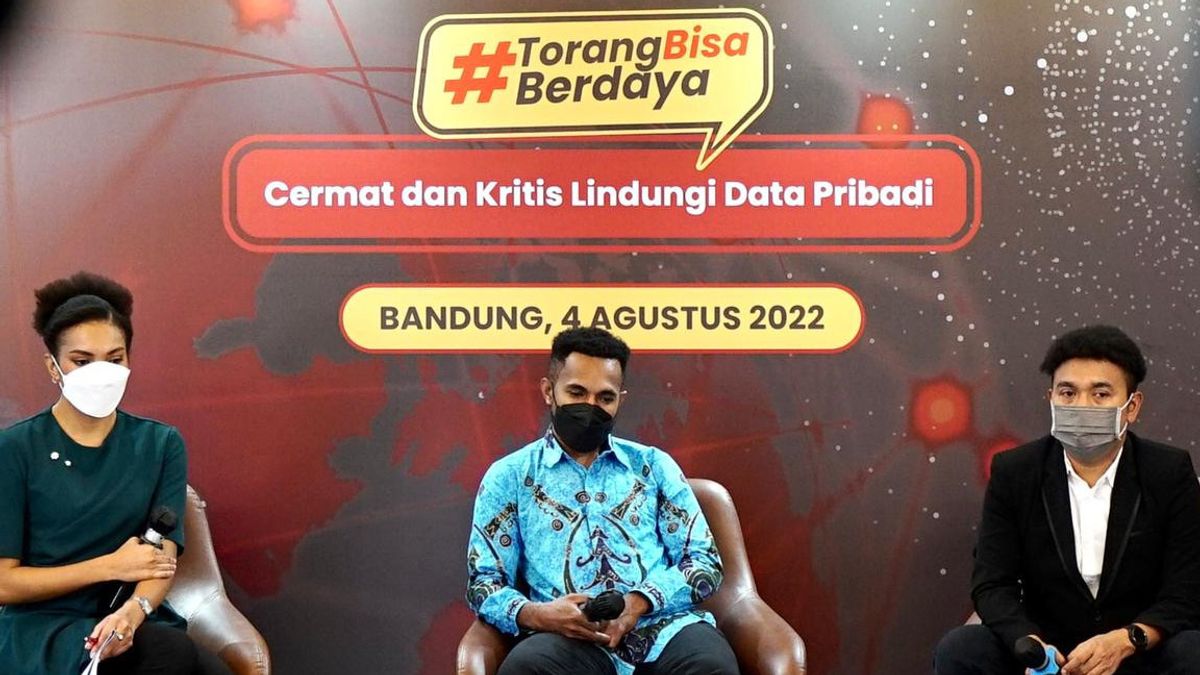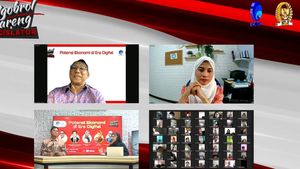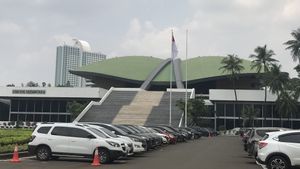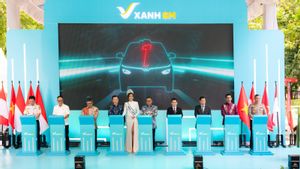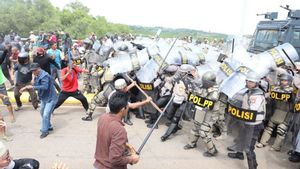JAKARTA - The increasing number of activities carried out on online platforms, such as online financial transactions and e-commerce shopping, increases the risk of personal data misuse. Data leakage can occur even though maintenance has been carried out so that data security is guaranteed confidentiality.
This was conveyed by the Director of Political, Legal and Security Information and Communication, Ministry of Communications and Informatics, Bambang Gunawan, in his remarks at the Digital Law and Human Rights Literacy Forum (FIRTUAL) with the theme "#Torang BisaBerdaya: Carefully and Critically Protect Personal Data", in Bandung, August 4th.
“The government must always be ready to face the threat of cybercrime, including the crime of data misuse. Data sovereignty must be realized and citizens' rights to personal data must be protected so that regulations need to be prepared without compromise," he stressed.
According to him, the regulation aims to make it easier for people to achieve their goals, provide a sense of security, make it easier for everyone to do good, and encourage all parties to innovate.
He stated that currently, the Ministry of Communication and Information is waiting for the continuation of the discussion of the Personal Data Protection Bill (PDP) which is already in the Indonesian House of Representatives. Meanwhile, while waiting for the ratification of the PDP Bill into law, the government continues to implement the PDP practice and enforcement through various efforts.

"In dealing with cases of personal data leakage, the Ministry of Communication and Informatics also encourages the implementation of education, literacy, and awareness-raising programs for PDP that involve multi-stakeholders on a wider scale," he said.
In addition, the Ministry of Communication and Informatics continues to build massive Information and Communication Technology (ICT) infrastructure from upstream to downstream for the sake of equitable distribution of digital migration.
In Papua Province, Kominfo through BAKTI has built 213 existing 4G BTS and 244 existing 4G BTS in West Papua from 2015 to 2020. In 2022, BAKTI will continue to build telecommunications infrastructure of 2,765 4G BTS, namely 2,220 in Papua and 545 in Papua. West.
“The existence of this 4G BTS is to bring the people of Papua and West Papua to migrate to the digital era. Of course, this infrastructure development must also be in line with the implementation of education, literacy, and awareness-raising PDP programs for the people of Papua and West Papua," he explained.
Meanwhile, data from BPS and APJII in 2018 states that internet users in Papua are the highest in eastern Indonesia. According to Bambang, this of course needs to be accompanied by literacy in safe internet usage and data protection for users in the area.
"This socialization is expected to be a moment to move together to maintain the security of personal data, as well as to increase people's digital literacy so that they are more aware of the security of personal data," he concluded.

The speakers who attended included the Head of Legal and Cooperation Team, Directorate General of Aptika, Ministry of Communication and Information, Josua Sitompul, Cyber Security Practitioner, Budi Rahardjo, Young Entrepreneur from Papua, Jonatan Warinussy, and Special Staff of the President of the Republic of Indonesia, Billy Mambrasar.
In the first session, legal expert Josua Sitompul who was present online said that in this day and age, data is the new oil of the digital economy.
Therefore, according to him, protection in cyberspace is needed to protect personal data in various processes or transactions. Currently, there are many existing approaches, both nationally, regionally, and internationally in protecting personal data.
He pointed out that in Indonesia alone there have been more than 30 laws and regulations ranging from Laws to Ministerial Regulations that regulate the protection of personal data which later underwent changes to the PDP Bill which is currently still being discussed in the DPR.
"It is hoped that through these progressive changes, Indonesia will have a strong personal data protection regime, so that it can help Indonesia in dealing with other global instruments," he said.
Also present online, Budi Rahardjo as a Cyber Security Practitioner explained about cyber security. According to him, weak passwords are the biggest problem in Indonesia.
"We must not use passwords that have anything to do with our personal data, no!," he said.
SEE ALSO:
He also provides tips to strengthen password security, namely by not using easy-to-guess words related to personal data or words in dictionaries, passwords should not be the same for different services, and must be changed periodically.
In addition, personal data needs to be protected because it can be used for fraud. According to him at this time it is not the problem of hacking that is more feared, but fraud.
As an entrepreneur from Papua, Jonatan Warinussy said that in this digital age, it is very easy for young entrepreneurs to be able to become entrepreneurs without the need for a physical store. But with this convenience, cybercrimes have also increased.
"To find business capital, young entrepreneurs usually use online loan platforms that are not registered because they don't understand, so their data can be stolen and misused," he explained.
Jonatan started his business in 2019, migrating from Papua to the city of Bandung to continue his education. He told me that his difficulty in finding culinary that matched his taste actually opened up opportunities for him to become a culinary entrepreneur.
"In the era of digital technology as it is today, it is very easy to do promotions, I usually use Instagram for marketing," he said.
Regarding the security of personal data, he reminded that before providing data, you must first make sure the platform is registered and can maintain privacy.
“In this digital era, our privacy can be open to anyone, especially those closest to us. Usually, the misuse of data can occur because at first we are not protective of our personal data until finally, data misuse can occur. So friends, you have to be more protective because personal data is very easy for cybercriminals," explained Jonatan.
In the next session, Billy Mambrasar explained that during the pandemic, digital access increased significantly. According to his experience when visiting Papua, several cities and villages that previously had no internet connection, are now connected.
He also revealed that internet users to produce creative works in Papua, West Papua, and also eastern Indonesia as a whole has increased. He admitted that he was surprised when the event, which was attended by thousands of people in the city of Padang, West Sumatra, knew many of the Papuan songs sung by Mace Purba.
"So imagine this internet making the works of Papuan children who previously did not know to know, and even heard not only throughout Indonesia but throughout the world," he explained.
However, according to him, ownership of internet access must also be accompanied by good digital literacy skills so as not to cause problems.
“Digital literacy is the ability to use technology and use that access for productive things. So we don't just use it for fun, but for work," he said.
He also reminded that Indonesian youth, especially Papuans, must be a generation that is smart in digital technology. Use technology for self-development, have the ability to filter information before passing it on to others, and can combine entrepreneurial and technology skills.
“Imagine if we can use this digital technology to create jobs and make changes. Don't just get into entertainment or just waste time, but be more productive using digital technology," he explained.
This event was held in a hybrid manner (offline and online) at Mercure Hotel Bandung City Center, and can be watched live through the Zoom Meeting application and the YouTube channel of the Directorate General of IKP Kominfo. In addition to providing material and question and answer sessions, the event was also enlivened by Social Media Challenge games that all participants could participate in.
This activity aims to provide an understanding to the general public, especially the Papuan community and related parties regarding the importance of cybersecurity and the risk of personal data theft in Indonesia, as well as being careful and critical in maintaining the security of personal data.
The English, Chinese, Japanese, Arabic, and French versions are automatically generated by the AI. So there may still be inaccuracies in translating, please always see Indonesian as our main language. (system supported by DigitalSiber.id)
